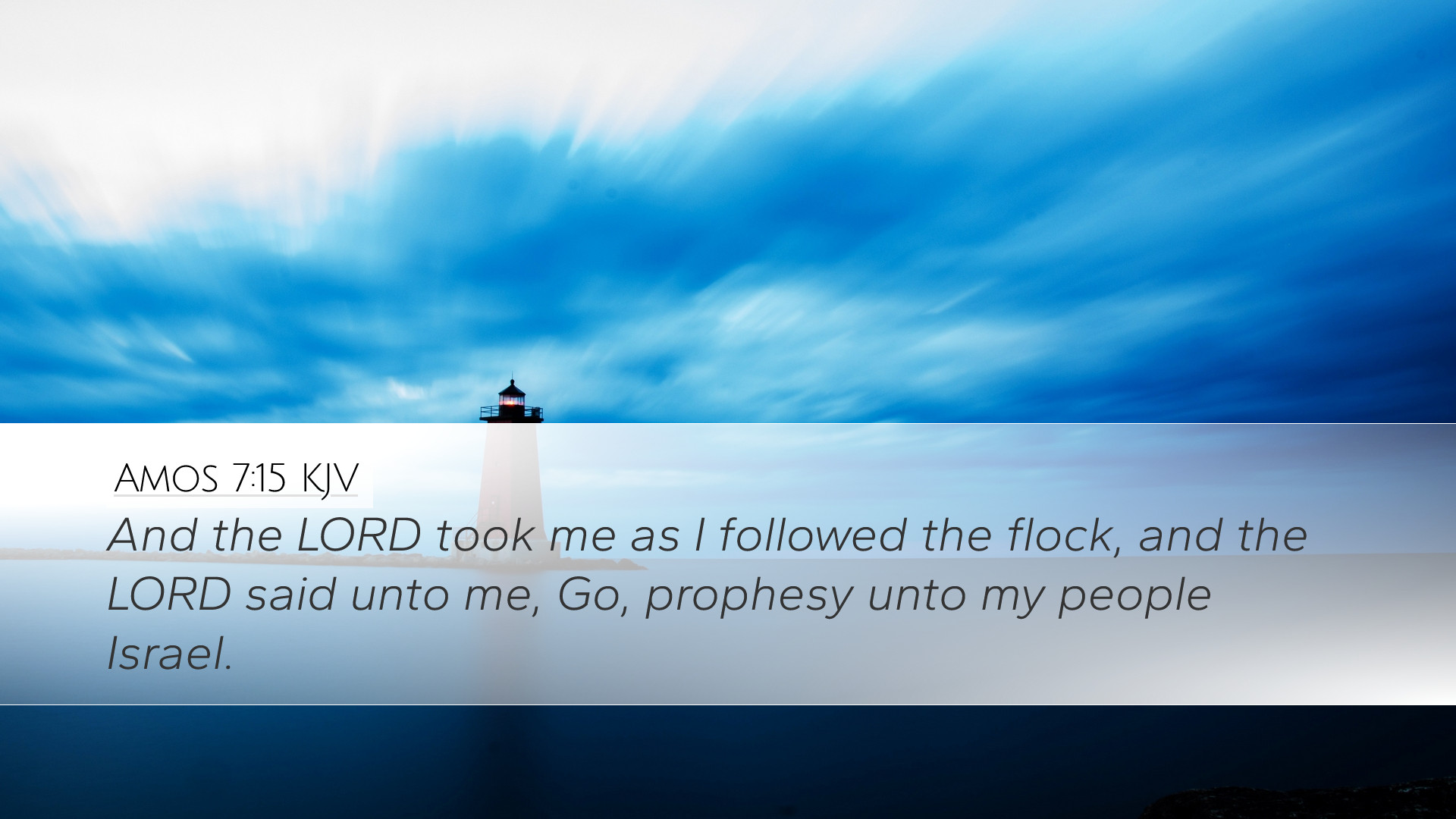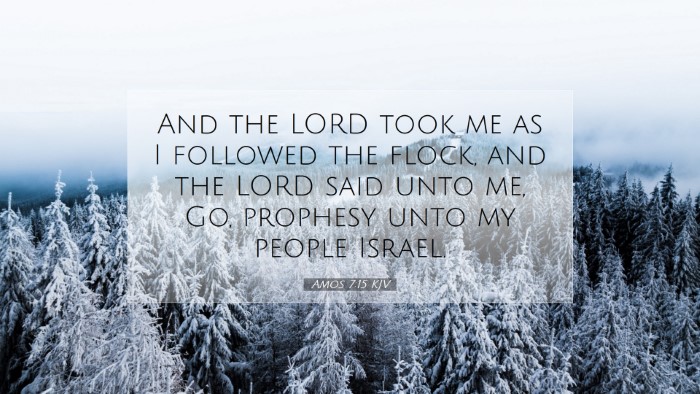Old Testament
Genesis Exodus Leviticus Numbers Deuteronomy Joshua Judges Ruth 1 Samuel 2 Samuel 1 Kings 2 Kings 1 Chronicles 2 Chronicles Ezra Nehemiah Esther Job Psalms Proverbs Ecclesiastes Song of Solomon Isaiah Jeremiah Lamentations Ezekiel Daniel Hosea Joel Amos Obadiah Jonah Micah Nahum Habakkuk Zephaniah Haggai Zechariah MalachiAmos 7:15
Amos 7:15 KJV
And the LORD took me as I followed the flock, and the LORD said unto me, Go, prophesy unto my people Israel.
Amos 7:15 Bible Commentary
Commentary on Amos 7:15
Verse Context: Amos 7:15 states, “But the LORD took me from following the flock, and the LORD said unto me, Go, prophesy unto my people Israel.” This verse reveals the divine calling of Amos, who transitions from a shepherd to a prophet commissioned by God to deliver His message to Israel.
Introduction
The book of Amos is central to understanding the prophetic literature of the Old Testament. Amos, a shepherd and dresser of sycamore trees from Tekoa, was called by God to prophesy during a time of peace and prosperity in Israel, which masked the moral decay and injustice prevalent among the people. This calling highlighted both the gravity of his mission and the sovereignty of God in choosing unlikely messengers.
Insights from Matthew Henry
Matthew Henry underscores the significance of Amos’s humble beginnings. He notes that God often chooses the weak and lowly to effect His purposes, emphasizing that divine calling is not based on social status or background. Amos’s shift from the mundane responsibilities of shepherding to a prophetic role illustrates God’s ability to transform lives.
- Divine Selection: Henry highlights how God “took” Amos, signifying a deliberate action where God sets apart individuals for His work. This act of divine selection raises the status of the otherwise lowly shepherd to an esteemed role within the covenant narrative.
- Prophetic Responsibility: The calling comes with a heavy responsibility. Amos is instructed to "prophesy" to Israel, which underscores the urgency and seriousness of his mission. As a prophet, he is to speak on behalf of God, a role that carries both authority and accountability.
Insights from Albert Barnes
Albert Barnes elaborates on the implications of Amos’s calling, focusing on the contrast between Amos's past and his future. Barnes notes that the task requires not only courage but also unwavering faith in God's message despite opposition.
- Context of the Call: Barnes emphasizes that God chose Amos during a time when Israel was prosperous yet corrupt, highlighting the prophetic role to confront the deception of well-being masking moral decay.
- Role of the Prophet: He points out that the prophet is not merely a foreteller but also a forth-teller, revealing God’s current message and calling for repentance, which is vital for understanding the historical context of Israel.
Insights from Adam Clarke
Adam Clarke provides a detailed examination of the theological aspects of Amos’s calling. He discusses the importance of divine callings and how it reflects God’s sovereignty over individual lives for a greater purpose.
- God’s Sovereignty: Clarke notes that this verse exemplifies God's control over humanity's direction. He can redirect anyone's life where He sees fit, transforming them into instruments for His glory.
- Humility of Amos: Clarke reflects on the humility of Amos. His reluctance to be elevated to a position of authority mirrors the common biblical theme of God using the humble to shame the proud.
Theological Implications
Amos 7:15 serves as an illustration of core theological themes including:
- Divine Calling: The act of calling reflects God's sovereign choice, which often contradicts human expectations of who should be used for His purposes.
- Transformation: The transformed identity of Amos from servant to prophet represents the transformative power of God's call on an individual's life.
- God’s Message: The prophetic voice serves to challenge status quos and confront injustices, which remain relevant in contemporary contexts.
Application for Today’s Believers
The lessons from Amos 7:15 resonate with believers today, particularly in recognizing that God calls individuals from all backgrounds to serve Him. It demonstrates that God’s work is not dependent upon human capabilities but rather His power and purpose.
- Embrace Your Calling: Believers are encouraged to discern and embrace their unique callings, understanding that God has a purpose for each life.
- Faithfulness in the Mundane: Amos’s life before the call reminds us that God values faithfulness in everyday tasks and that He can use those experiences as a foundation for greater work.
- Responding to God’s Commission: Like Amos, modern believers must be willing to respond to God’s commission, regardless of how inconvenient or challenging it may be.
Conclusion
Amos 7:15 encapsulates a pivotal moment in the life of the prophet Amos and serves as a powerful reminder of God’s initiative in calling and commissioning individuals for His purposes. By drawing from the insights of esteemed commentators, it becomes clear that God’s plans often transcend human expectations. As contemporary followers of Jesus, we are inspired by Amos’s transition from shepherd to prophet to remain attentive and responsive to God’s voice in our lives.


